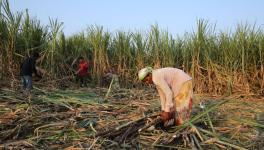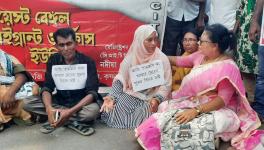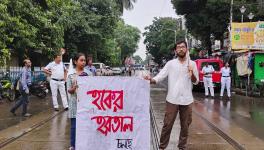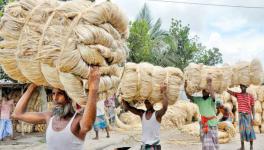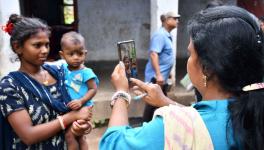ASHA Workers March to Demand Minimum Wages and Recognition as Workers
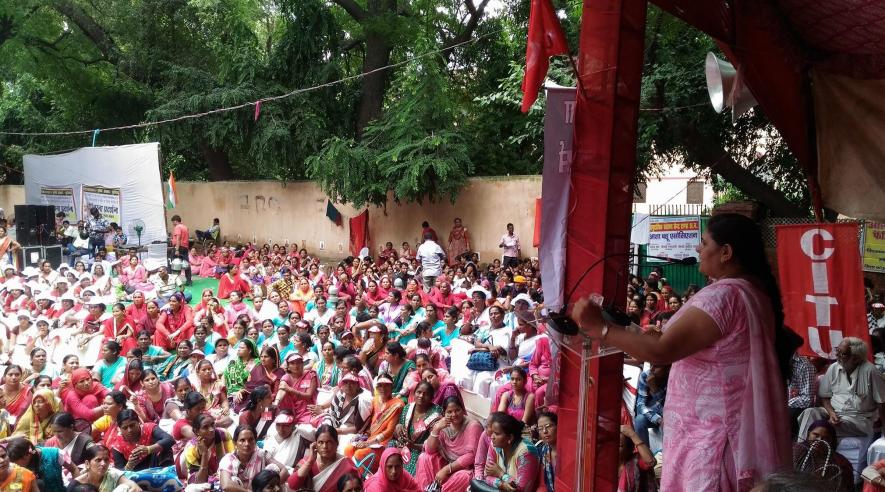
Thousands of ASHA (Accredited Social Health Activist) workers from 11 states marched in Delhi on Monday demanding that the government accept their longstanding demands.
ASHA workers are not recognised by the government as workers. Considered “volunteers”, they are paid piece-rate incentives, far below the minimum wage. ASHA workers have been demanding for many years that they be recognised as workers. The protest in Delhi was led by All India Coordination Committee of Asha Workers (CITU).
On Monday, 21 August 2017, more than 6000 ASHA workers marched from Ram Lila Maidan in Delhi and gathered at Jantar Mantar to submit a memorandum with 50 lakh signatures to the central government. The signatures were those of ASHA workers themselves, facilitators (who are part of the “support mechanism for ASHA”), beneficiaries of the work done by ASHA workers, and the general public.
There are almost 9 lakh ASHA workers in India, working under the National Health Mission (NHM).
The NHM came into being as the National Rural Health Mission (NRHM), started in 2005 for a period of seven years, was extended for another five years and expanded to cover urban areas as well. Currently there being no clarity regarding the future of the Mission, making NHM a permanent programme of the government is one of the main demands of the protesting ASHA workers.
The objective of the NHM has been to improve the delivery of basic health services in the country. The ASHA workers act as the link between the rural population and the public health system.
According to the Mission, ASHA workers are the "first port of call for any health related demands of deprived sections of the population, especially women and children, who find it difficult to access health services".
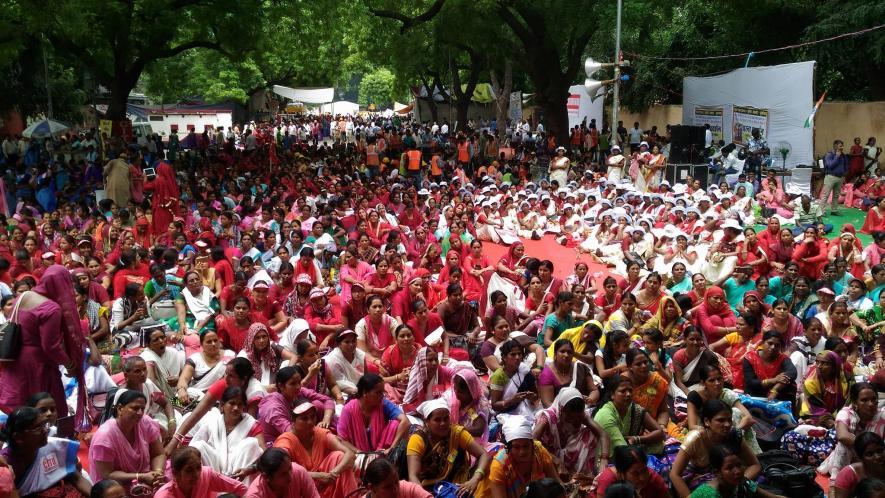
The ASHA workers form the mainstay of the rural health system in many parts of India, by imparting basic health education and services to the poor as well as by helping them to access public health facilities.
While the ASHA workers have played an important role in improving the health services in India, their pay and service conditions are woefully inadequate. They are paid meagre amounts as incentive for each task they perform, and they work in the most difficult conditions. According to activists, the monthly income earned by an ASHA worker in most parts of India ranges between Rs. 1000 to Rs. 4000 per month.
The 45th Indian Labour Conference (ILC) held in May 2013 had recommended that scheme workers such as ASHAs should be recognised as workers, that they be paid minimum wages and that social security benefits should be ensured to them. The ILC is the “apex level tripartite consultative committee in the Ministry of Labour & Employment to advise the Government on the issues concerning working class of the country”. It comprises central trade unions, central organisations of employers and central and state governments.
The recommendation of the 45th ILC regarding scheme workers was reiterated by the 46th ILC as well.
The ASHA workers have organised a number of mass protest programmes and conventions in different parts of India over the past few years.
Workers at Monday’s protest demanded that the ILC recommendations regarding scheme workers be implemented. They demanded that the ASHA workers be regularised as ‘Health Workers’, that they be paid minimum wages of Rs. 18,000 per month with variable Dearness Allowance (DA), and that they be provided social security benefits such as pension, gratuity and maternity benefits.
The workers criticised the moves to privatise the public health system, and demanded that the budget allocation for health be raised to at least 6% of the GDP. Infrastructure in all public health facilities must be improved, they said.
Activists who spoke at the rally demanded that ASHA workers be paid a fixed monthly remuneration equivalent to the statutory minimum wage for skilled workers in the respective states, pending regularisation.
The public meeting at Jantar Mantar was inaugurated by Tapan Sen, General Secretary of the Centre of Indian Trade Unions (CITU), and addressed by Ranjana Nirula, Convenor of the All India Coordination Committee of Asha Workers (AICCAW).
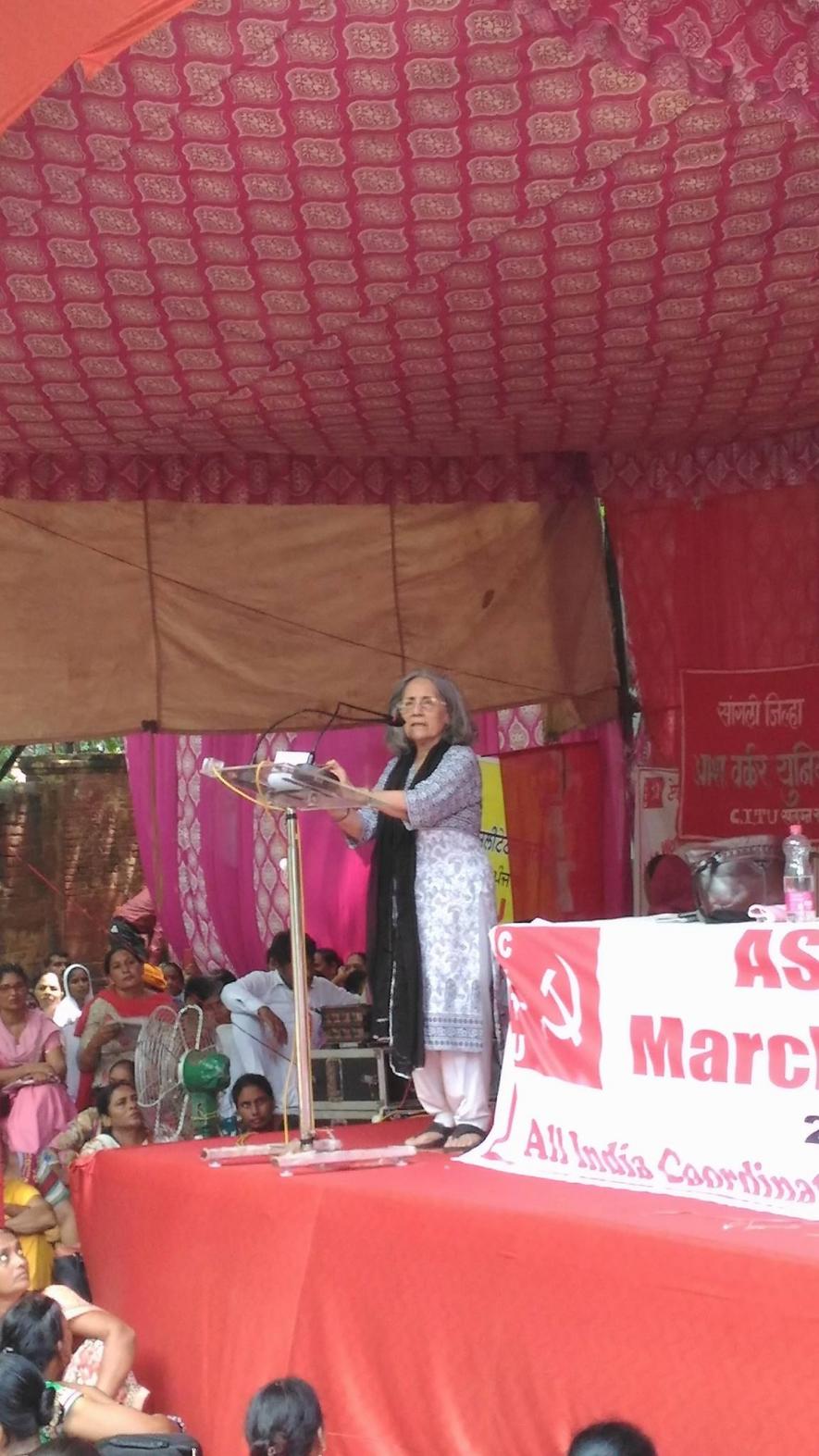
Asha Sharma of the All India Democratic Women’s Association (AIDWA), Suneet Chopra of the All India Agricultural Workers Union (AIAWU), Vijoo Krishnan of the All India KisanSabha (AIKS), VP Sanu of the Students Federation of India (SFI), Jai Bhagwan of the Midday Meal Workers Federation of India and AR Sindhu of the All India Federation of Anganwadi Workers and Helpers spoke at the meeting in solidarity with the ASHA workers.
A delegation led by TapanSen and RanjanaNirula met the Union Health Secretary and submitted the ASHA workers’ memorandum with 50 lakh signatures.
The AICCAW has announced that ASHA workers would participate in large numbers in the three-day dharna by workers at the Parliament Street from 9 to 11 November 2017.
Get the latest reports & analysis with people's perspective on Protests, movements & deep analytical videos, discussions of the current affairs in your Telegram app. Subscribe to NewsClick's Telegram channel & get Real-Time updates on stories, as they get published on our website.













